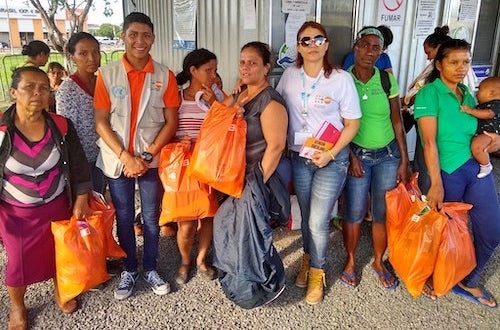News
Venezuelan volunteers provide humanitarian relief to migrants, refugees
- 15 July 2019
News
CUCUTA, Colombia; BOA VISTA, Brazil; ESMERALDAS-SUCUMBIOS, Ecuador; TUMBES, Peru – Economic and political upheaval in Venezuela continue to fuel a mass exodus of migrants and refugees from the country. Some 4 million refugees and migrants have poured across the border, according to host governments.
The migrants and refugees face serious humanitarian needs, including food, health care, safety and social services. Many are crossing borders on foot, trekking for days or weeks, sometimes with little or no shelter.
Despite the deprivation and desperation, many migrants are banding together as volunteers, helping their community members find safety and access vital services.
“It’s all about the desire to do something for others, to not remain indifferent," said Tania Velasco, who crossed the border from Venezuela to Colombia two and a half years ago.
UNFPA is helping to empower migrants like Ms. Velasco to act as humanitarian responders. UNFPA offers psychosocial counselling to migrant volunteers, as well as training to provide assistance in the sensitive areas of sexual and reproductive health and gender-based violence. Volunteers also receive a stipend.
The volunteers work in groups of six to 10, performing outreach in migrant communities. They disseminate health information and help people access health care, particularly reproductive health services. They also refer survivors of gender-based violence to supportive services.
Ms. Velasco is particularly well suited to the role. In the Colombian city of Cúcuta, her day job involves working with women at risk of gender-based violence.
She was actually born in Colombia 27 years ago, but relocated to Venezuela as a child. The crisis forced her to return to her home country, and she has since been moved to help however she can.

Last year, she took part in a UNFPA-supported programme that distributed thousands of contraceptives to migrant and refugee women from Venezuela. She also helped increase access to prenatal services.
Ander Guerra, 20, left Venezuela last year. He spent three months at a shelter, where he had to stand in line to shower or eat.
But that did not stop Mr. Guerra. Instead, it gave him the courage to persevere.
He eventually settled in Boa Vista, the capital of the Brazilian state of Roraima.
He studied late into the night for two months to learn Portuguese.
Today, Mr. Guerra volunteers at a bus station where he gives Venezuelan migrants information on sexual and reproductive health, and on preventing gender-based violence. He also helps survivors of sexual abuse and human trafficking find assistance.
“Sharing information helps others. And helping others can save lives,” he told UNFPA. “I understand the challenges people face because I've been there."
Soledad Guayasamín, a UNFPA staff member dealing with the Venezuelan exodus in Ecuador, says dozens of young people are volunteering to provide sexual and reproductive health information in Esmeraldas and Sucumbios.
Volunteers can be particularly effective in delivering messages and services, said
Irina Bacci, a UNFPA humanitarian worker in Brazil.
“Volunteers engage people at the community level because they work in shelters and places where migrants typically gather," she explained. "They also provide training and share information on services and care pathways, and that makes them community leaders.”
And their own experiences can help motivate them, said Zilda Cárcamo Pérez, a UNFPA risk management expert in Perú, another destination for the mass exodus of people leaving Venezuela in search of a better future.
“Their presence helps ensure the needs of women and young people are met in an emergency,” she noted.
– Liliana Arias & Tomer Urwicz